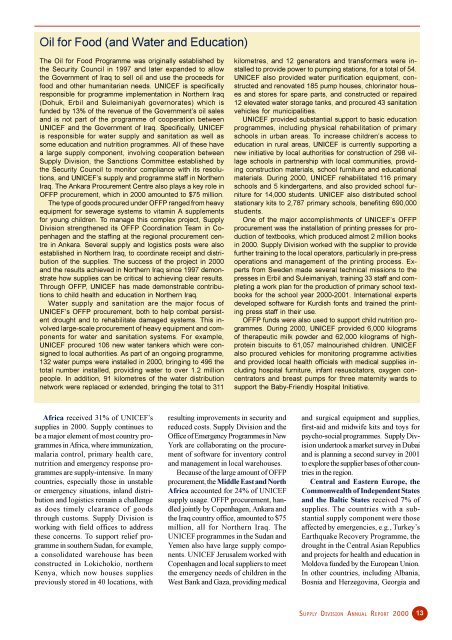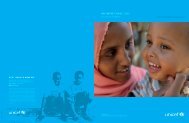Medical supplies and equipment - Unicef
Medical supplies and equipment - Unicef
Medical supplies and equipment - Unicef
Create successful ePaper yourself
Turn your PDF publications into a flip-book with our unique Google optimized e-Paper software.
Oil for Food (<strong>and</strong> Water <strong>and</strong> Education)<br />
The Oil for Food Programme was originally established by<br />
the Security Council in 1997 <strong>and</strong> later exp<strong>and</strong>ed to allow<br />
the Government of Iraq to sell oil <strong>and</strong> use the proceeds for<br />
food <strong>and</strong> other humanitarian needs. UNICEF is specifically<br />
responsible for programme implementation in Northern Iraq<br />
(Dohuk, Erbil <strong>and</strong> Suleimaniyah governorates) which is<br />
funded by 13% of the revenue of the Government’s oil sales<br />
<strong>and</strong> is not part of the programme of cooperation between<br />
UNICEF <strong>and</strong> the Government of Iraq. Specifically, UNICEF<br />
is responsible for water supply <strong>and</strong> sanitation as well as<br />
some education <strong>and</strong> nutrition programmes. All of these have<br />
a large supply component, involving cooperation between<br />
Supply Division, the Sanctions Committee established by<br />
the Security Council to monitor compliance with its resolutions,<br />
<strong>and</strong> UNICEF’s supply <strong>and</strong> programme staff in Northern<br />
Iraq. The Ankara Procurement Centre also plays a key role in<br />
OFFP procurement, which in 2000 amounted to $75 million.<br />
The type of goods procured under OFFP ranged from heavy<br />
<strong>equipment</strong> for sewerage systems to vitamin A supplements<br />
for young children. To manage this complex project, Supply<br />
Division strengthened its OFFP Coordination Team in Copenhagen<br />
<strong>and</strong> the staffing at the regional procurement centre<br />
in Ankara. Several supply <strong>and</strong> logistics posts were also<br />
established in Northern Iraq, to coordinate receipt <strong>and</strong> distribution<br />
of the <strong>supplies</strong>. The success of the project in 2000<br />
<strong>and</strong> the results achieved in Northern Iraq since 1997 demonstrate<br />
how <strong>supplies</strong> can be critical to achieving clear results.<br />
Through OFFP, UNICEF has made demonstrable contributions<br />
to child health <strong>and</strong> education in Northern Iraq.<br />
Water supply <strong>and</strong> sanitation are the major focus of<br />
UNICEF’s OFFP procurement, both to help combat persistent<br />
drought <strong>and</strong> to rehabilitate damaged systems. This involved<br />
large-scale procurement of heavy <strong>equipment</strong> <strong>and</strong> components<br />
for water <strong>and</strong> sanitation systems. For example,<br />
UNICEF procured 106 new water tankers which were consigned<br />
to local authorities. As part of an ongoing programme,<br />
132 water pumps were installed in 2000, bringing to 496 the<br />
total number installed, providing water to over 1.2 million<br />
people. In addition, 91 kilometres of the water distribution<br />
network were replaced or extended, bringing the total to 311<br />
Africa received 31% of UNICEF’s<br />
<strong>supplies</strong> in 2000. Supply continues to<br />
be a major element of most country programmes<br />
in Africa, where immunization,<br />
malaria control, primary health care,<br />
nutrition <strong>and</strong> emergency response programmes<br />
are supply-intensive. In many<br />
countries, especially those in unstable<br />
or emergency situations, inl<strong>and</strong> distribution<br />
<strong>and</strong> logistics remain a challenge<br />
as does timely clearance of goods<br />
through customs. Supply Division is<br />
working with field offices to address<br />
these concerns. To support relief programme<br />
in southern Sudan, for example,<br />
a consolidated warehouse has been<br />
constructed in Lokichokio, northern<br />
Kenya, which now houses <strong>supplies</strong><br />
previously stored in 40 locations, with<br />
resulting improvements in security <strong>and</strong><br />
reduced costs. Supply Division <strong>and</strong> the<br />
Office of Emergency Programmes in New<br />
York are collaborating on the procurement<br />
of software for inventory control<br />
<strong>and</strong> management in local warehouses.<br />
Because of the large amount of OFFP<br />
procurement, the Middle East <strong>and</strong> North<br />
Africa accounted for 24% of UNICEF<br />
supply usage. OFFP procurement, h<strong>and</strong>led<br />
jointly by Copenhagen, Ankara <strong>and</strong><br />
the Iraq country office, amounted to $75<br />
million, all for Northern Iraq. The<br />
UNICEF programmes in the Sudan <strong>and</strong><br />
Yemen also have large supply components.<br />
UNICEF Jerusalem worked with<br />
Copenhagen <strong>and</strong> local suppliers to meet<br />
the emergency needs of children in the<br />
West Bank <strong>and</strong> Gaza, providing medical<br />
kilometres, <strong>and</strong> 12 generators <strong>and</strong> transformers were installed<br />
to provide power to pumping stations, for a total of 54.<br />
UNICEF also provided water purification <strong>equipment</strong>, constructed<br />
<strong>and</strong> renovated 185 pump houses, chlorinator houses<br />
<strong>and</strong> stores for spare parts, <strong>and</strong> constructed or repaired<br />
12 elevated water storage tanks, <strong>and</strong> procured 43 sanitation<br />
vehicles for municipalities.<br />
UNICEF provided substantial support to basic education<br />
programmes, including physical rehabilitation of primary<br />
schools in urban areas. To increase children’s access to<br />
education in rural areas, UNICEF is currently supporting a<br />
new initiative by local authorities for construction of 298 village<br />
schools in partnership with local communities, providing<br />
construction materials, school furniture <strong>and</strong> educational<br />
materials. During 2000, UNICEF rehabilitated 116 primary<br />
schools <strong>and</strong> 5 kindergartens, <strong>and</strong> also provided school furniture<br />
for 14,000 students. UNICEF also distributed school<br />
stationary kits to 2,787 primary schools, benefiting 690,000<br />
students.<br />
One of the major accomplishments of UNICEF’s OFFP<br />
procurement was the installation of printing presses for production<br />
of textbooks, which produced almost 2 million books<br />
in 2000. Supply Division worked with the supplier to provide<br />
further training to the local operators, particularly in pre-press<br />
operations <strong>and</strong> management of the printing process. Experts<br />
from Sweden made several technical missions to the<br />
presses in Erbil <strong>and</strong> Suleimaniyah, training 33 staff <strong>and</strong> completing<br />
a work plan for the production of primary school textbooks<br />
for the school year 2000-2001. International experts<br />
developed software for Kurdish fonts <strong>and</strong> trained the printing<br />
press staff in their use.<br />
OFFP funds were also used to support child nutrition programmes.<br />
During 2000, UNICEF provided 6,000 kilograms<br />
of therapeutic milk powder <strong>and</strong> 62,000 kilograms of highprotein<br />
biscuits to 61,057 malnourished children. UNICEF<br />
also procured vehicles for monitoring programme activities<br />
<strong>and</strong> provided local health officials with medical <strong>supplies</strong> including<br />
hospital furniture, infant resuscitators, oxygen concentrators<br />
<strong>and</strong> breast pumps for three maternity wards to<br />
support the Baby-Friendly Hospital Initiative.<br />
<strong>and</strong> surgical <strong>equipment</strong> <strong>and</strong> <strong>supplies</strong>,<br />
first-aid <strong>and</strong> midwife kits <strong>and</strong> toys for<br />
psycho-social programmes. Supply Division<br />
undertook a market survey in Dubai<br />
<strong>and</strong> is planning a second survey in 2001<br />
to explore the supplier bases of other countries<br />
in the region.<br />
Central <strong>and</strong> Eastern Europe, the<br />
Commonwealth of Independent States<br />
<strong>and</strong> the Baltic States received 7% of<br />
<strong>supplies</strong>. The countries with a substantial<br />
supply component were those<br />
affected by emergencies, e.g., Turkey’s<br />
Earthquake Recovery Programme, the<br />
drought in the Central Asian Republics<br />
<strong>and</strong> projects for health <strong>and</strong> education in<br />
Moldova funded by the European Union.<br />
In other countries, including Albania,<br />
Bosnia <strong>and</strong> Herzegovina, Georgia <strong>and</strong><br />
SUPPLY DIVISION ANNUAL REPORT 2000 13





